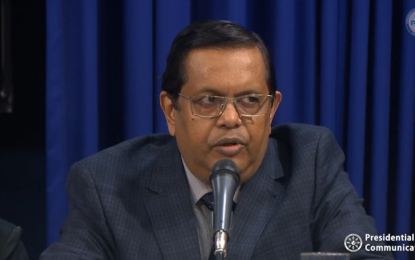
World Health Organization country representative Dr. Rabindra Abeyasinghe (File photo)
MANILA – Vaccine optimism is one of the possible factors causing the surge of confirmed Covid-19 cases in the country, World Health Organization (WHO) country representative Dr. Rabindra Abeyasinghe said on Monday.
Abeyasinghe made this comment in televised public briefing in response to the remark of former adviser to the National Task Force Against Covid-19, Dr. Tony Leachon, who claimed the slow response of the national government is the cause of the rise in cases.
“This increase is not limited to the Philippines. We have seen increase in other countries that have been rolling out vaccines rather successfully, so it is something larger than the slow response.,” he said.
He noted the arrival of vaccines has caused public to be lax in observing the minimum health protocols as many of them leave their homes more often.
“With the arrival of vaccines in many countries, there was an optimism that people can go back quickly to the way they lived a life before the pandemic. These little changes with compliance with protocols are believed to have caused an opportunity for the virus to transmit more freely,” he said.
On Monday, the Department of Health reported 8,019 new confirmed cases which pushed the number of active cases to 80,970 and the country’s tallied Covid-19 infections to 671,792.
AstraZeneca is safe to use
In the same televised briefing, Abeyasinghe said the United Kingdom’s AstraZeneca Covid-19 vaccine is effective and safe to use amid reports of 40 people who suffered from thromboembolism after getting the vaccine in Europe.
“We are happy to state that the EMA [European Medicines Agency], after careful evaluation of all data, has agreed with the WHO’s position that does not see a causal link with the AstraZeneca vaccine with the frequency of thromboembolic episodes [blood clot] that have been reported in the population,” Abeyasinghe said.
Abeyasinghe said the 40 cases are small number compared to 20 million vaccinees in Europe and 30 million vaccinees in other countries who did not experience thromboembolism after receiving AstraZeneca Covid-19 shots.
“Our position is that there is no evidence that the vaccine is causing those episodes [of people experiencing blood clot] and therefore the usefulness of using the vaccine that this vaccine far outweighs the sporadic episodes [of blood clot] reported to WHO," he added.
Nonetheless, Abeyasinghe encouraged countries using the AstraZeneca Covid-19 vaccine to still monitor adverse events following vaccination.
Earlier, the Food and Drug Administration said AstraZeneca Covid-19 vaccine has 70 percent efficacy rate after the administration of the second dose.
The country kicked off its vaccination of March 1 following the arrival of 600,000 Sinovac doses donated by the Chinese government.
On March 4, the government welcomed 487,200 doses of AstraZeneca vaccines through the COVAX facility followed by another set of 38,400 doses that arrived on March 7. (PNA)
